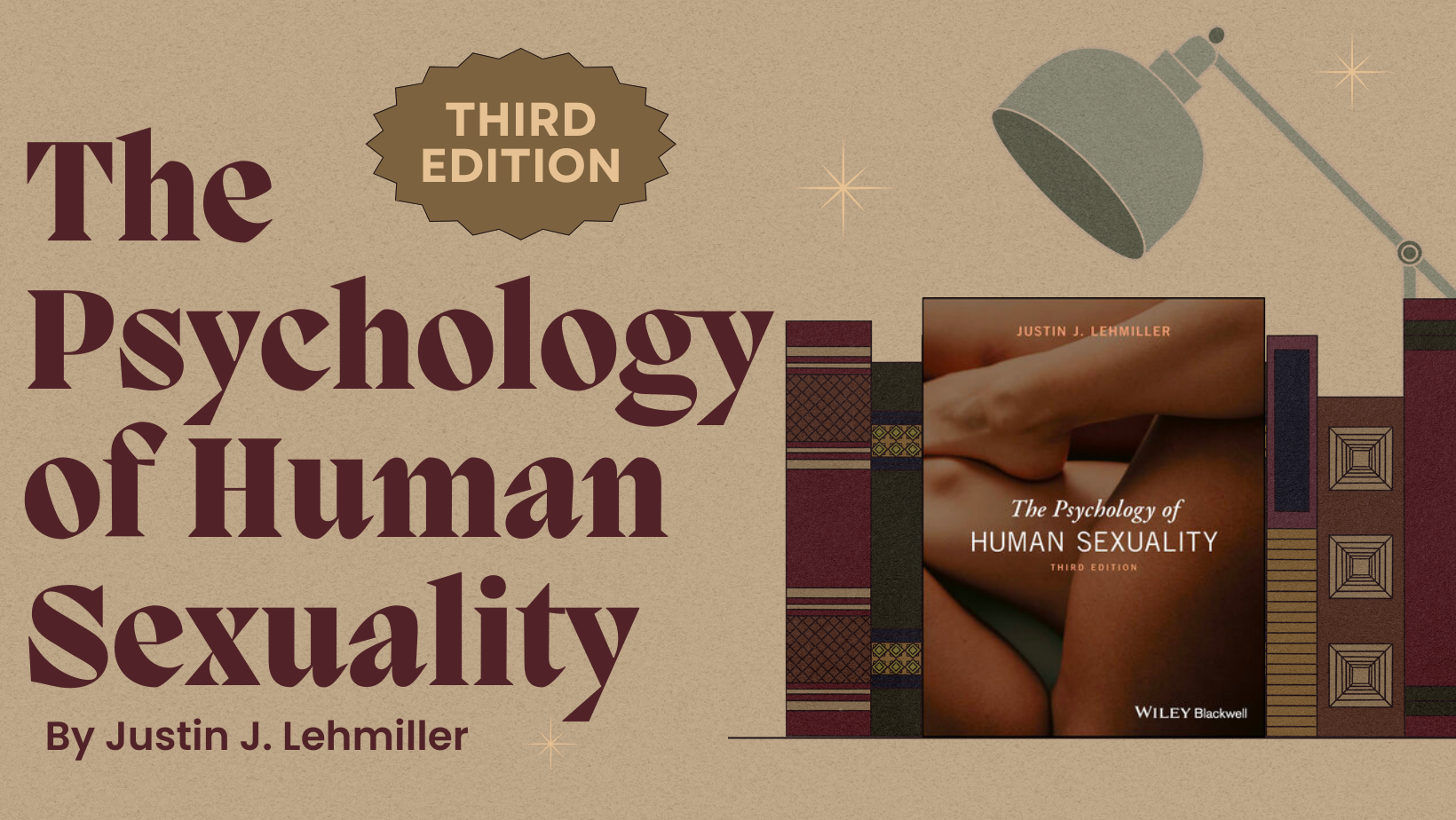Announcing The Psychology of Human Sexuality, 3rd Edition!
February 1, 2024 by Emily Mendelson
The third edition of The Psychology of Human Sexuality by Dr. Justin Lehmiller is officially available! This textbook is a comprehensive guide to major theoretical perspectives on human sexuality, and is ideal for use in an undergraduate classroom (although it may also be appropriate for some specialty and advanced seminars; plus, it can be used as a general reference guide for anyone interested in the science of sex!). The content in the new edition reflects some of the most recent research on human sexuality and covers a broad range of topics from a sex-positive perspective.
This edition contains fifteen chapters (perfect for a semester’s worth of content!) and each chapter has been thoroughly revised and updated from the second edition. These enhancements include: exploration of cutting-edge research findings, updates to studies that have not replicated, greater focus on cross-cultural differences, and deeper discussions of diverse sexualities. This edition also contains more practical information that can benefit readers’ own intimate lives and relationships.
Additions and Changes to the Third Edition
A comprehensive list of edits made to the third edition can be found in the instructor materials provided by the publisher (linked below!). However, here is a brief sampling of some of the major revisions and additions to each chapter.
Chapter 1: Theoretical Perspectives on Human Sexuality
Given the irreversible impact COVID-19 has had on our lives, this chapter now includes a discussion on how the pandemic has impacted sexual behavior. Additionally, contemporary research has been incorporated to reflect the myriad biopsychosocial influences on modern sexual behavior.
Chapter 2: Sexology Research: History, Methods, and Ethics
This chapter features two new sections; Hidden Figures in Sexology and How Reliable are the Results of Sex Studies? The first section highlights the contributions of women and persons of color to the field of sexology; the second provides a discussion on the challenges of conducting sex research in the modern era.
Chapter 3: Human Sexual Anatomy
You might think we already knew everything there was to know about anatomy, but we’re still learning! Among other things, this chapter explores new research on clitoral anatomy, the G-spot, female ejaculation, and more.
Chapter 4: Human Sexual Response: Understanding Arousal and Orgasm
A ton of new research has been added to this chapter! For example, there is expanded coverage of how sensory impairments impact sexual arousal and responses (which is particularly timely in light of how long COVID can affect the senses). Significant changes have also been made to the Orgasm section, including how hormone therapy impacts orgasm for transgender persons, as well as new research that shows how the sexual response cycle is more variable than previously thought.
Chapter 5: Gender and Gender Identity
As our understanding of gender and gender identity has expanded, so has this chapter. There have been significant additions made that discuss the current prevalence of trans identities, how to navigate language controversies, as well as recent data and controversies surrounding puberty blockers.
Chapter 6: Sexual Orientation
The terms allosexual, graysexual, and demisexual are now introduced in this chapter, and there is more information on the genetics of sexual orientation and the prevalence of non-heterosexual identities in the United States and around the world. Sexual Configurations Theory is now covered in this chapter as well.
Chapter 7: The Laws of Attraction
This chapter offers coverage of classic and contemporary theories of attraction, with expanded coverage of LGBTQ attraction processes and what people today consider to be relationship “dealbreakers” and “dealmakers.”
Chapter 8: Intimate Relationships: Sex, Love, and Commitment
Many of the sections in this chapter have been expanded significantly, including Singlehood, Hookups, Friends with Benefits, Married vs Cohabiting, Healthy Sexuality, and Cheating. Among other things, these revisions speak to changes in sexual and romantic relationship initiation, as well as motivations behind cheating. Likewise, many new key terms have been introduced since the last edition, including solo polyamory and compersion.
Chapter 9: Sexual Behaviors
This chapter includes updated research on threesomes and group sex, gender differences in sexual fantasy, and contemporary trends in sexual behavior, such as pegging. The section on anal sex offers enhanced coverage of the difference between porn and real-life anal activities, and explores the role of PrEP in HIV prevention.
Chapter 10: Lifespan Sexual Development
Recent research reflects the rise of youth sexual inactivity, gender identity development in trans youth, and how puberty is experienced in transgender and gender diverse youth, all of which have been integrated into this chapter. Additionally, the Sexuality and Aging section illuminates seniors’ reasons for having sex as well as the important role of oral sex later in life.
Chapter 11: Sex Education, Contraception, and Pregnancy
A wealth of information has been added to this chapter, including changes in the status of sex education and how it varies across cultures, expanded discussion of minority groups that are often left out of sex ed, and the side effects of birth control. This chapter now also reflects the Dobbs Supreme Court decision and information about abortion laws around the world.
Chapter 12: Sexually Transmitted Infections and Safer-Sex Practices
Emerging research on STIs and their effects is reflected in this chapter. It also incorporates current statistics on STI prevalence and new screening recommendations.
Chapter 13: Sexual Dysfunction and Sex Therapy
This chapter now address the difference between a “sexual difficulty” and a “sexual disappointment.” It also provides current information on strategies for dealing with various sexual problems (including desire discrepancies), as well as more information on controversial terms in this area, such as “sex addiction.”
Chapter 14: Variations in Sexual Behavior
New research has been integrated throughout this chapter, including the prevalence of BDSM participation, the prevalence of various ‘paraphilic’ fantasies, and the interpersonal component of some fetishes. Additionally, kink is now introduced as a key term, and more information is provided on the origins of kinky fantasies and interests.
Chapter 15: Sex Laws, Sexual Victimization, and the Sexual Marketplace
This chapter features a new and important section on Sexual Consent, which delves into controversies over how consent is defined and explores the highly varied legal definitions of it. Information about the scope of sex trafficking, contemporary porn use, and men and women’s motivations for buying sex have also been updated.
Teaching Resources for The Psychology of Human Sexuality
Official teaching materials consist of an instructor’s manual, revision guide, test bank, and PowerPoints for each chapter, which can be requested here on the companion site for instructors. We also have blog posts that detail how to use the Sex and Psychology blog content as well as how to use podcast content in ways that complement each chapter. These blog posts summarize materials generously created by Dr. Steven Rouse, which can be found here as well. Needless to say, there are a ton of resources to make sure the textbook content can be seamlessly integrated into your classroom!
Where to Purchase the Text
Instructors can find the third edition of The Psychology of Human Sexuality on the Wiley website, in addition to the instructor companion site. The textbook can also be found on Amazon here.
Want to learn more about Sex and Psychology? Click here for more from the blog or here to listen to the podcast. Follow Sex and Psychology on Facebook, Twitter (@JustinLehmiller), or Reddit to receive updates. You can also follow Dr. Lehmiller on YouTube and Instagram.

Dr. Justin Lehmiller
Founder & Owner of Sex and PsychologyDr. Justin Lehmiller is a social psychologist and Research Fellow at The Kinsey Institute. He runs the Sex and Psychology blog and podcast and is author of the popular book Tell Me What You Want. Dr. Lehmiller is an award-winning educator, and a prolific researcher who has published more than 50 academic works.
Read full bio >


